- Home
- Harlan Ellison
Other Glass Teat Page 15
Other Glass Teat Read online
Page 15
What does surprise me is that apparently (from the sound, or lack of it) the audience found it quite in keeping. They listened with awe and delight to Ms. Susann, Mrs. Mansfield, the personification of success in our times, the glamorous and glorious jetsetting manifestation of everything to which they aspire: wealth, position, acclaim, prestige. They paid dutiful, respectful attention to her mewling and distasteful parallel. It is surely destiny that ordained that the basest utterance of modern man should emerge from Jacqueline Susann.
Which brings me to the Winston cigarette commercials and what they, along with Ms. Susann’s pronouncement, add up to in these declining days of the American Empire. The deification of the yahoo. The ennobling of anti-intellectualism. The aggrandizement of the gauche and the idolatry of ignorance.
There’s a linkup, yes there is.
Surely it hasn’t escaped you?
Hee Haw, Nashville Music, Petticoat Junction, The Beverly Hillbillies, Mayberry RFD, Where’s Huddles?, Happy Days, of course, George Putnam and his interpretation of the news…but most flagrantly, the Winston cigarette commercials, all of them personify a frightening trend toward anti-intellectualism that goes far beyond the rube, hick, yahoo fear of erudition that has haunted this country since its earliest days.
In his sheet, on his horse once more, the Common Man rides again!
As this is another of those nebulous yet very real trends—like McCarthyism or Reagan’s police stateism—it’ll take two columns really to get into it, so for this week’s tag I’ll just remind you of the Winston commercials, refresh your memories, let you dwell on what they portend on this subject, start the fear tremors, and go away.
A young, longhaired, obviously snotnosed punk driving a sports car he can’t afford (his daddy prob’ly bought it for him; you can tell that little bastard never did an honest day’s labor with his hands) pulls up in front of a country store. Rocking back and forth, whittling on a stick, sits a front-porcher of venerable years, looking insular, looking canny, looking down his nose at the city kid. The little prick gets out of his car and points to a cigarette billboard declaring WINSTON TASTES GOOD LIKE A CIGARETTE SHOULD. “Hey, Pops,” the kid says, in early Blackboard Jungle jargon, “don’t you know that’s bad grammar? It oughta be, ‘Winston tastes good as a cigarette should.’” At which point, from the woodwork possibly, leap half a dozen rural toughs, who bound about in a highly threatening manner, bleating the accusation, “Whuuuuuduya want? Good grammar or good taste?” (As though the two had anything to do with one another or were incompatible.)
They chivy and harass this model of what all rural folk despise and fear in urban life, and quickly show the upstart what they think of his highfalutin’ ways. They dump his ass in a watering trough. He pops up after a minute, in a vain attempt to stave off lynching (which surely takes place as the commercial fades out), and recants, averring that, “Winston tastes good like a cigarette should!”
Again. A tall, thin, pince-nez’d gentleman, very likely a professor of linguistics or philology, finds his way to a truck in a loading dock. There’s that Winston sign, omnipresent on the side of the van. He says to the foreman in charge, in a snooty, nasal, smart-alecky way, “Bed gremmeh, don’ch’know? That ought to be as, not like.” And sure as hell, here come a horde of muscular troglodytes from the warehouse, and they threaten the bejeezus out of this old guy, and like the kid, he pulls a Galileo and renounces correct grammar to save his hide.
One more. An emaciated, birdlike dude with glasses wanders into a secretarial pool and pulls the same dumb number. Bad grammar. So the chicks attack him, slam his skinny tail into a typing chair and run him around the pool till he begs off and joins the illiterates. (Well, no great loss; it’s obvious from the stereotype that the guy couldn’t fuck worth a damn anyhow, so why should all those leggy, made-up, sexy chicks treat him like a human being? He’s an intellectual pisshead, we all know that, and we also know that that kind of creep never gets all those great, brainless mannequins hipped on Gregg and suchlike to fall down and Do It.)
Are we getting the message, friends?
The Visigoths are with us. They are telling us that it’s hardhat time, that Adlai Stevenson was a fag and Albert Einstein needed a haircut and if you want to read a book, try Jacqueline Susann.
And if you want to survive the pogrom, bookworms, go yahoo.
But whatever you do, don’t come back here next week for the second and final, smashing concluding installment of William Faulkner Meets Jerk Man. You might learn something, and god knows these days that’s a ticket to destruction.
76: 21 AUGUST 70
THE DAY OF THE YAHOO: PART TWO
My secretary, Hallie a.k.a. Susan, points out to me that the anti-intellectual trend in America is even evident to those of you not concerned with the Glass Teat. She notes, for instance, that newspaper crossword puzzles now have the solutions published the same day, not the next or a week later. She’d offer me instances off the tube, but she doesn’t have a television set. (She contends it’s bad for the complexion and gives her “female troubles” three times a month. I thought I was in bad shape when Crazy June went on to other pastures. I didn’t know when I was well off.)
Well, she doesn’t need to bring such video vacuities to my attention. I see them all. Such as the raising-to-god status of Lumpenproletariat like the football player-cum-college student who stood guard over the flagpole soon after the Kent State massacre, who refused to allow his fellow students to lower the flag to half-mast in memory. It’s okay to half-mast Old Glory for Ev Dirksen, one of the more corrupt public officials to go to his much-deserved judgment, but it’s a patriotic no-no to weep for kids senselessly slain by golem in Reserve uniforms. That silly git, that muscle-brained pigskin patriot, has received thousands of letters from similarly minded humanitarians, commending him for his defense of a scrap of cloth. It is a manifestation of the anti-intellectual attitude that property rights far outweigh human rights.
And, of course, Winston Cigarettes (emphysema in a cylinder), not to be outdone, has its rousing huzzah in favor of the proletariat in its never-ending struggle with the aristocracy: a commercial break, friends.
This old lady with the lace collar and the lorgnette makes the error of correcting one of her servants that Winston tastes good as, rather than like, a cigarette should. The minor altercation takes place in the old lady’s stately rococo mansion, and noblesse oblige being what it is, not to mention mon dieu et mon droit, one would expect the scullery maid to fall to her knees and beg the grande dame not to buggy-whip her. But in appealing to the boob mentality, it is a foregone conclusion that the Common Man is better than the aristocracy, simply because he has good down-to-earth common sense and none of that high-falutin’ manner. (Images of the duke and his men, riding their horses through the peasant’s potato patch…images of Madame Defarge rocking and knitting as Marie Antoinette gets the original skinhead haircut…images of Jim Fisk and other robber barons grinding the faces of the poor with their gold bootheels…images of the stalwart country lads at Lexington, freezing their asses off…lotta images reinforcing that arid Leninist doctrine that all workers are saints, all bosses are bastards.)
So instead of groveling—as a proper servant should—the arrogant serving wench has the audacity to point her (remarkably well-manicured for a servant) finger at the old woman, and out of the walls emerge other servants—butler, footman, cook, upstairs maid—and they begin to chivy and hector the old lady till it seems certain she’ll have an occlusion right there before our horrified eyes. “Whuuuuuuduya want, good grammar or good taste?” the staunch defenders of illiteracy demand. The old woman is shocked; the servants are revolting!
(Revolting, hell: they’re downright disgusting!)
They drive her before them like the last remnants of the royal family, and finally pen her up in a sliding panel behind a bookcase, and take over the house, cavorting and rampaging like groundlings in a castle. Finally, the panel slides back and the ol
d woman, having learned her lesson (presumably, not to mess around with John L. Lewis or the Wobblies), mumbles in a cowed voice, “Winston tastes good like a cigarette should!”
End commercial.
Just what have we seen, gentle readers? What do the Winston commercials with their browbeaten and physically threatened college professors, ped ants, city slickers, emasculated Ichabod Cranes and aristocratic septaugeneric shrikes say to us? They say, the day of the yahoo is on us. They say, the time of the booboisie is here. They say, the Common Man knows best. They say, there is only equality in nonintellectual views of the universe.
A statement echoed in the speeches of Spiro T. Aggrandizement when he attacks the Hatfield-McGovern antiwar bill on grounds Nixon knows best and no one should argue with The Man.
Well, what of all this equality business? Take the ten-second pro/anti-intellectualism test: would you rather everyone was free or equal? One or the other. None of the above is not a responsive answer. Okay, made your decision? Then consider this quote from Will and Ariel Durant’s The Lessons of History:
“…freedom and equality are sworn and everlasting enemies, and when one prevails the other dies. Leave men free, and their natural inequalities will multiply almost geometrically…To check the growth of inequality, liberty must be sacrificed…Even when repressed, inequality grows; only the man who is below the average in economic ability desires equality; those who are conscious of superior ability desire freedom; and in the end superior ability has its way.” The italics are mine.
The point being, of course, we must have equal opportunity for freedom. When every man is given free access to the reins of self-realization and power, we allow each man to do the best he can. De facto imprisonment by caste or economic ghettoization (which is what we now have) is a hype. It is lip service to liberty. But actual, real unfettering of the total population being the answer, give me freedom over equality every time.
It is only Spiro and Winston who want everyone equal.
(It reminds me of the Johnny Hart B.C. strip that had a bitter bite for male chauvinists. One of the cavemen was making fun of a prehistoric Women’s Lib type. He gibes at her, as she walks past, “Hey, I hear you want to be my equal.” She takes a long, pointed look at him, continues walking, and tosses over her shoulder, “Frankly, I had something a little loftier in mind.”)
Which is the inherent horror of anti-intellectualism. It postulates that anyone who seeks to be better must be evil, must be—by inference—putting down the poor commoner. Well, that’s malarkey. (You remember malarkey: a common word of the thirties and forties.) Smarter and quicker and more inventive is better, dammit, and we’re wallowing through a world where slower and dumber and more compliant is dangerous. I did all this on the Common Man in my columns of 17 and 25 October, last year. You can find them in my book, if you need reinforcement of what’s coming down, as explicated last week and this week.
By serving to gap us once again, this time by IQ and intellectual pursuit, “they” reinforce their hold over the mass of us. Young against old, liberal against conservative, white against black, Jew against Arab, “they” will use any difference to keep us apart. One of these days we’ll run a list of names, telling exactly who “they” are, so you can fit titles to your paranoias, but for the nonce it serves us here to name them as the Winston people and their amoral advertising agency who dreamed up the vicious eyesore commercials that pour hardener into the prejudices of the scuttlefish out there in the Great American Heartland who fear civil disobedience, student unrest, dissidence, change…intellectualism.
You see, it’s like this. The times are perilous. The government feels the tremors. There are too many people asking questions, too many people using their heads for the first time. Too many people suddenly saying, “Hold it a minute. I didn’t know that! Is that what it’s all about?” And when that happens, Spiro love, it means you get a plague of Hatfields and McGoverns. And neither you nor Baby Dickie can handle it. You can drive people like Angela Davis and Abbie Hoffman mad as mudflies, so they do something brutal and stupid and self-destructive, but you can’t cope with all the Hatfields and McGoverns who operate on your level and won’t bully under to that venomous bullshit of character assassination and slanted reportage.
The only way they can keep us quiescent, the only way they can make every man look askance at his fellows, is by keeping us dumb. And anti-intellectual pogroms are a strong weapon in the armory.
It’s all around us. And the Common Man will go for it every time. History says so. The beware signs are up.
The question thus becomes: are we smart enough to drag the dummies up to a thinking level, to get them cerebrating…or do we allow ourselves to be slaughtered or driven off?
Think about it. Yeah, think.
PUBLIC CORRECTION: Several weeks ago, doing a number on the upcoming Matt Lincoln series, I made the unforgivable error of attributing to one man the writings of another. I said The Challenge, an excellent script for an ABC Movie of the Week, was written by Irving Elman, producer of Matt Lincoln. It was a strong point in his favor, I thought. Where I got the information that Mr. Elman had scripted that particular piece of joy, I don’t know. But I was woefully inaccurate. The scenarist who wrote The Challenge was Marc Norman. Let me say that again, in caps (because corrections and retractions usually appear on back pages, in unreadable type): MARC NORMAN WROTE THE CHALLENGE AND IT WAS A HELLUVA FINE SCRIPT.
The correction came to my attention through several sources, not the least of which was Mr. Elman, whose response to my column may interest you. I print it herewith, in its entirety.
“Dear Harlan:
“You goofed. I did not write ‘The Challenge,’ starring Darren McGavin,
etc. Any more than I wrote ‘The Oscar.’ You threw your tomato at the wrong target.
“But then your column was full of misdirected tomatoes.
“When I made the Leopold-Loeb crack, if I thought you’d take it as a straight line, I would have spelled it out as the j-o-k-e it was intended to be. I had assumed that from the context of our conversation you’d understand that since everything else about the character had changed, it would have made no sense to call him by the same name. So we threw a bunch of names into a hat and came up with ‘Matt Lincoln.’ Sorry you don’t care for it, but at least it wasn’t ‘Harlan Ellison’ or ‘Irving Elman.’
“As for your reviewing a series, the first picture of which has yet to be finished, let alone seen by anyone, and judging it lousy, I consider that a miracle of critical prescience. How are you at reading tea leaves?
“Anyway, I don’t mean to carp, because I did enjoy your column. It was a lot of laughs.
“Peace, Irving Elman.”
Well. How about that? And after I went so far out of my way to be fair and upfront about Matt Lincoln. It just goes to prove you shouldn’t play j-o-k-e-s on dumb, humorless bastards like tv columnists, doesn’t it? Because I assumed that you were telling me the serious, straight truth, Mr. Elman. I mean, now you say the Lincoln name came out of a hat. That makes three different versions of how Leopold was changed to Lincoln, all from your mouth, sir. (I commend those of you who need back information to the column of two weeks ago.) Which are we to believe? If you say a hat, sir, then I guess we’re lucky his name wasn’t Matt Stetson 8½. But I’d even have settled for “Irving Elman” as a realistic alternative. “Harlan Ellison” sounds phony and made up. You’re wise not to have used it. And just politely to refresh your memory, I didn’t review the series, I reviewed the pilot film, and made some comments about what I hoped not to see in the series, based on fears of my correspondents. But then, you know that, Mr. Elman. You didn’t really think I was reviewing a series I hadn’t yet seen, did you? Huh, did you?
My tea leaf ability is almost as bad as my Oscar scripting, but it’s nowhere near as good as my evaluations of people who play mickeymouse with me when I ask them if I can see a segment of two of a series and they tell me no, they can’t s
how them to me…not “the films aren’t yet finished,” but no, you can’t see them. If they weren’t done, why not just say that instead of giving me a blanket lockout? As Marc Norman will attest, I can make mistakes, Mr. Elman, but at least my books are open for examination at all times. How’s that for laughs, sir?
77: 4 SEPTEMBER 70
The Catholic Church is, I believe, generally credited with immortalizing the directive, “Give me your children till they are six—and they are mine forever.” That’s pretty heady stuff, when you stop to think how many kinder there are growing up in the shadow of the Holy Trinity. But it is nothing compared to the scale on which American Society debases its female population when it says, “Give me your girl-children till they are old enough to enter the World’s ‘Our Little Miss’ Variety Pageant—and they’ll be doomed forever to be either hookers or consumers, or both.”
How it came to pass that I was provided with the knowledge that informs this week’s installment is a small trip, so I’ll take you on it, as I was taken. It was a week ago Wednesday, August 19. About eight o’clock. I was getting ready to go out to a screening, when the phone rang, and a voice said, “You don’t know me, man, and it isn’t important, but you ought to turn on Channel 11 right now. You are not going to believe what’s going on, on that channel!” I asked what it was, and the guy on the other end just repeated, “Turn it on for one second. If ever there was a column, that’s it, man.”
So he hung up after I’d thanked him, and out of wild curiosity I turned it on, and there—about three-quarters over—was something called the WORLD’S “OUR LITTLE MISS” VARIETY PAGEANT. I was only able to watch five minutes of it, and then had to split, but I was so intrigued and horrified that when Mary Reinholz called me the next morning—to inform me this week’s Freep would be a Women’s Lib edition, staffed and prepared by the ladies—to ask me if I’d slant my column toward Women’s Lib, I was able to tell her, “Dear heart, I was gonna do it anyhow. I’ve got myself a doozy this week.” (Just so you don’t think I’m pandering.)

 Repent, Harlequin! Said the Ticktockman
Repent, Harlequin! Said the Ticktockman Broken Glass
Broken Glass Other Glass Teat
Other Glass Teat Memos From Purgatory
Memos From Purgatory I Have No Mouth and I Must Scream
I Have No Mouth and I Must Scream The Deadly Streets
The Deadly Streets The Glass Teat
The Glass Teat Paingod and Other Delusions
Paingod and Other Delusions No Doors No Windows
No Doors No Windows Strange Wine
Strange Wine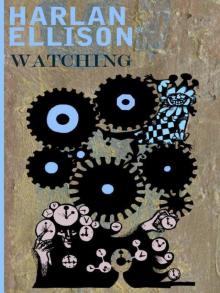 Harlan Ellison's Watching
Harlan Ellison's Watching Over the Edge/An Edge in My Voice
Over the Edge/An Edge in My Voice Troublemakers: Stories by Harlan Ellison
Troublemakers: Stories by Harlan Ellison Gentleman Junkie and Other Stories of the Hung-Up Generation
Gentleman Junkie and Other Stories of the Hung-Up Generation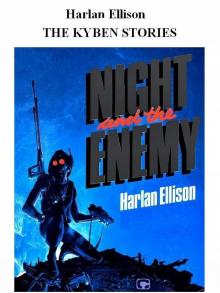 The Kyben Stories
The Kyben Stories From the Land of Fear
From the Land of Fear The Top of the Volcano: The Award-Winning Stories of Harlan Ellison
The Top of the Volcano: The Award-Winning Stories of Harlan Ellison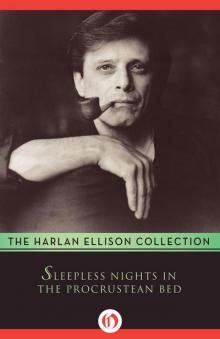 Sleepless Nights in the Procrustean Bed
Sleepless Nights in the Procrustean Bed Ellison Wonderland
Ellison Wonderland Children of the Streets
Children of the Streets Can & Can'tankerous
Can & Can'tankerous Love Ain't Nothing but Sex Misspelled
Love Ain't Nothing but Sex Misspelled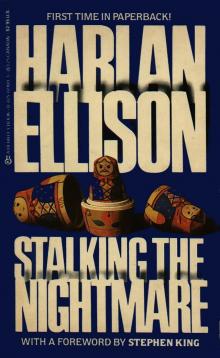 Stalking the Nightmare
Stalking the Nightmare Approaching Oblivion
Approaching Oblivion Deathbird Stories
Deathbird Stories Partners in Wonder
Partners in Wonder Web of the City
Web of the City Spider Kiss
Spider Kiss A Boy and His Dog
A Boy and His Dog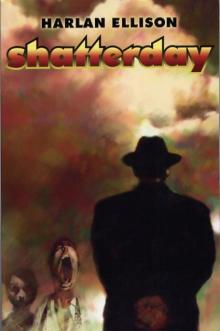 Shatterday
Shatterday Slippage: Previously Uncollected, Precariously Poised Stories
Slippage: Previously Uncollected, Precariously Poised Stories Repent, Harlequin! Said the Ticktockman
Repent, Harlequin! Said the Ticktockman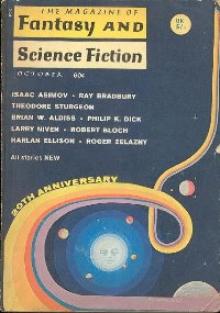 Come to Me Not in Winter's White
Come to Me Not in Winter's White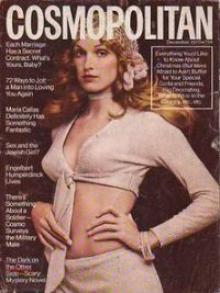 The Song the Zombie Sang
The Song the Zombie Sang The Other Glass Teat
The Other Glass Teat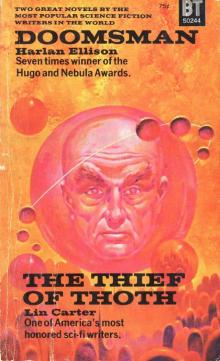 Doomsman - the Theif of Thoth
Doomsman - the Theif of Thoth The City on the Edge of Forever
The City on the Edge of Forever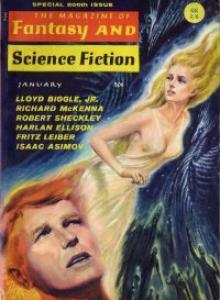 I See a Man Sitting on a Chair, and the Chair Is Biting His Leg
I See a Man Sitting on a Chair, and the Chair Is Biting His Leg The Harlan Ellison Hornbook
The Harlan Ellison Hornbook Pulling A Train
Pulling A Train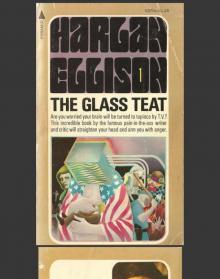 The Glass Teat - essays of opinion on the subject of television
The Glass Teat - essays of opinion on the subject of television An Edge in My Voice
An Edge in My Voice Angry Candy
Angry Candy Troublemakers
Troublemakers The Top of the Volcano
The Top of the Volcano Over the Edge
Over the Edge Survivor #1
Survivor #1 Slippage
Slippage